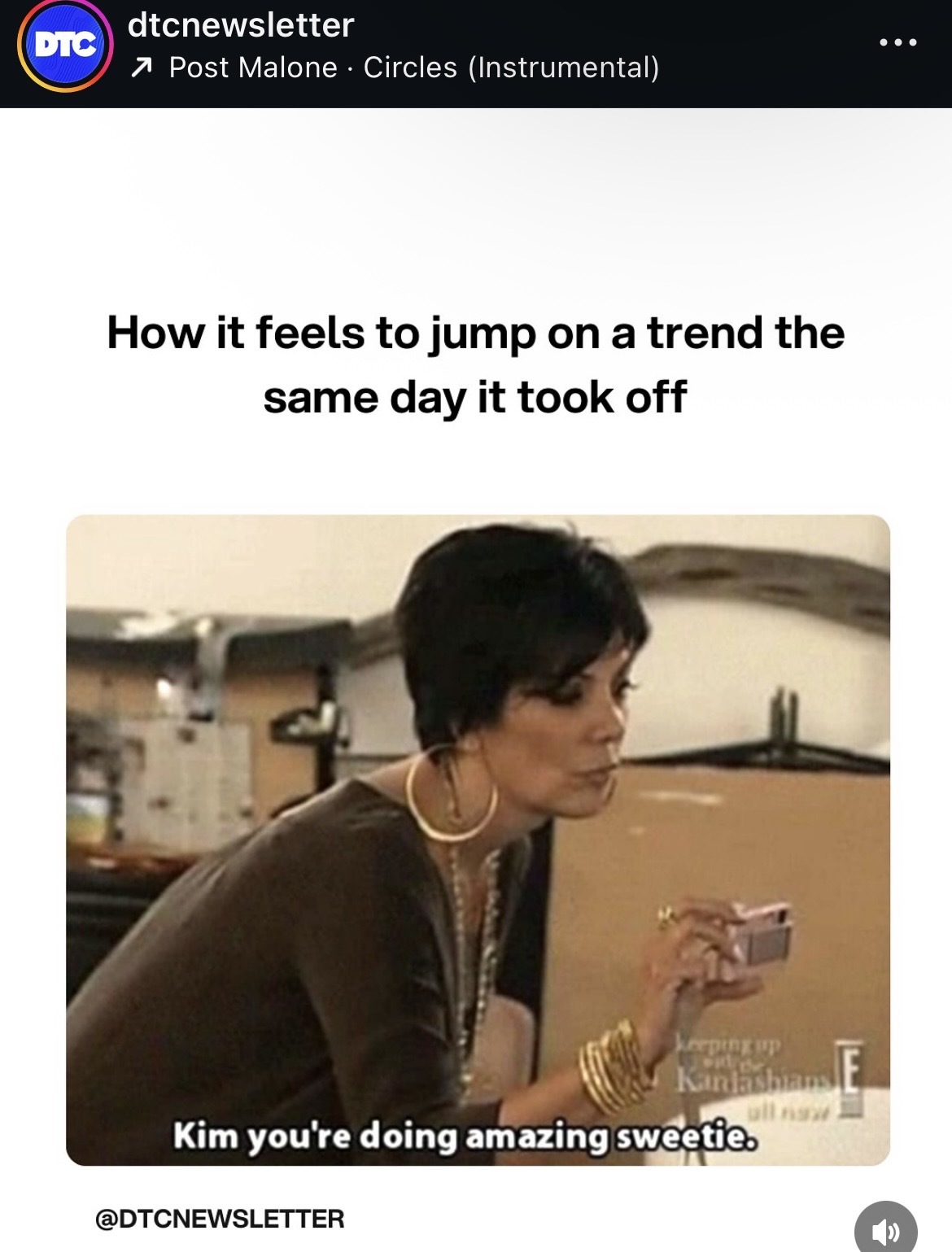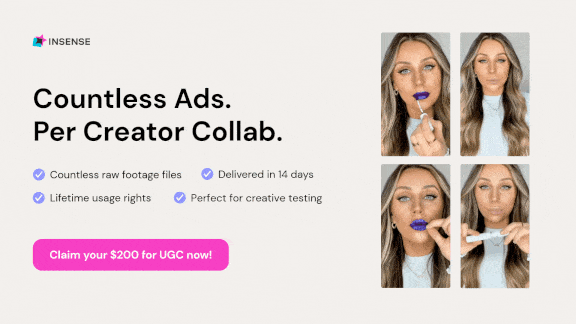
Back

Content
Content

Welcome to the DTC family!
Oops! Something went wrong while submitting the form.

Back

Content



Good morning,
Here’s what you’ll find in today’s DTC:
🔥 Google Gamifies Search Experience → What this means for brands and advertisers.
⭐ Lessons From Anna Wintour → The importance of having discernment.
🚨 Daily Tariff Update → U.S. signs trade deal with Japan.
🏆 Work Your Angles! → Turn one winning hook into many.
You’re reading this newsletter along with new subscribers from: Calgary Winter Club, Alpenglow Supply, and Italia Ceramics. 👋

🤔 Ready For Some Winning Marketing Math? 1 UGC Creator = 20+ Ad Variations—All For Under $150
👀 Wondering how major DTC brands, including Beauty Pie, Bones Coffee, Flo Health, and Aceable, scale UGC without killing team bandwidth?
They use Insense to make insanely cost-effective UGC ads. 💸
👏 From just one brief, get numerous raw footage clips to mix, match, and turn into multiple scroll-stopping creatives for your paid social ads.
💥 Source 20+ pieces of raw content (per creator) with lifetime usage rights, all delivered in 14 days or less.
Cost-effective UGC with lifetime usage rights?
Yes please!! 🙌
☎️ Book a free strategy call and get $200 for your first campaign.
* sponsored

🔥 Google Wants To Get Users Searching More With Mini Games
Google is testing a new search game that rewards users with badges and trivia challenges when they “dive deeper into topics” like football, culinary, shopping, or showbiz.
Some users online have shared that the feature appears at the bottom of search results, inviting them to “earn a badge” by answering a trivia question or performing related searches.
Users can earn milestone badges (1 day, 2 day, or 5 day) by returning multiple days in a row, unlocking more trivia challenges. In total, there are 32 achievements across 8 topics.
This experiment shows how Google is working to make search more engaging and habit-forming, a direct response to the rise of AI-powered answer engines like ChatGPT and Perplexity, which provide instant, conversational results outside of Google’s ad ecosystem.
Why this matters for ecommerce brands:
1️⃣ More time spent in Google’s ecosystem: If users play these mini-games, they’re less likely to jump off the platform, which could boost impressions and CTR for ads and organic listings.
2️⃣ New commercial touchpoints: With “shopping” included as a topic, gamified search could open fresh opportunities for product discovery especially if badges tie into shoppable moments.
3️⃣ Shifting SEO dynamics: Google’s goal is clear: encourage deeper searches and repeat visits. Ecommerce brands should anticipate changes in how users engage with queries and structure their SEO to capture intent across multiple searches.
The takeaway?
Google isn’t just protecting ad revenue. It’s reshaping the search experience to be stickier, gamified, and less skippable.
For ecommerce marketers, the playbook is clear:
In short: gamified search has the potential to create stickier experiences, fresh touchpoints, and a new stage for ecommerce visibility.

📦 Your Daily Tariff Check-In
Whether it’s a minor tweak or a major shift, we’ll keep you posted on the latest tariff changes—so you’re always in the know.
September 5, 2025 update:

🌞 Millions Of Shoppers Turn To Walmart.Com Every Summer For Travel Must-Haves, Outdoor Essentials And Seasonal Gear
💥 NexGrill, an outdoor cooking and heating brand, joined Walmart Marketplace in 2022.
With access to millions of customers, zero monthly fees, and powerful ecommerce tools, they grew from a small startup to a global brand in just two years. 📈
Today, they’re a Pro Seller with nearly triple the SKUs and a 200% YOY revenue increase. 💵
👏 Now’s your chance to follow their lead, and as a new seller you’re eligible to save up to $75,000 in New-Seller Savings, Walmart’s incentive program going on now.
* sponsored

🎧 Why Brands Should Stop Chasing Tastemakers and Start Practicing Discernment
In the age of AI-generated content and viral creative, “taste” has become a buzzy concept.
But here’s the truth: taste is subjective, often elitist, and rarely scalable.
For DTC brands navigating the complexities of modern advertising, discernment, not taste, is the real advantage.
Aves from Pilothouse shares how Anna Wintour, long-time editor-in-chief at Vogue, is often called a “tastemaker” but her superpower is actually her razor-sharp discernment.
Wintour doesn’t just know what looked good, she knew what aligned with her audience, her medium, and her timing.
Discernment is the ability to judge what fits your brand. It’s how you decide whether to lean into generative AI content or stay rooted in handcrafted creative.
Brands like Liquid Death use AI because it fits their disruptive, punk-inflected brand. But if Diptyque took the same approach, it would feel dissonant and off-brand.
So how can brands practice discernment?
Here’s a few tactical tips:
👉 Listen to the full episode with Aves here and learn how to create a discernment rubric.

[Screenshot via @nicktheriot_/ X]
Stop treating one winning hook like it’s the finish line.
Scale comes from knowing how to spin one proven angle into a dozen variations.
Can't view the image? Click here

💸 You're missing out on shoppers from ChatGPT and Gemini. Put your products in front of AI users with Athena, trusted by 200+ brands like Ollie, Gruns, Latico Leather, and Motion. Get your free AI Search audit. *
* sponsored

📥 Got a B2B Biz?
Join dozens of B2B companies finding demand-gen success through our niche community of 150k brand leaders and founders this year. Talk to our team to learn more.
Have you heard our latest podcasts?
Don’t forget to rate the DTC Podcast on Apple (⭐️⭐️⭐️⭐️⭐️)
DTC Newsletter is written by Rebecca Knight and Frances Du. Edited by Eric Dyck.
Please note that items in this newsletter marked with * contain sponsored content.

